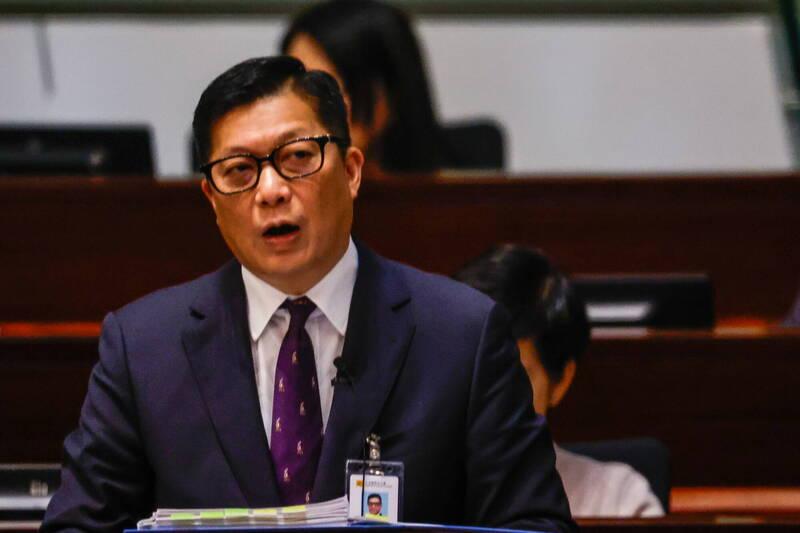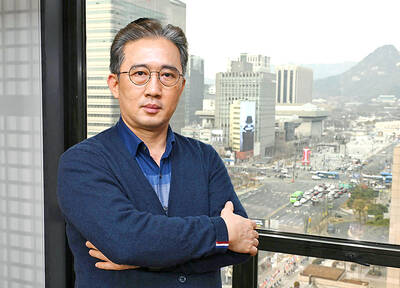Hong Kong today imposed bounties of HK$1 million (US$128,728) on six more pro-democracy campaigners deemed to have violated national security laws, and revoked the passports of seven others, in a continuing security squeeze in the financial hub.
Hong Kong's Secretary for Security Chris Tang (鄧炳強) said the six – all based overseas in countries including the UK and the US – had engaged in the alleged crimes of incitement to secession, subversion and collusion with foreign forces.
The six included UK-based commentator Chung Kim-wah (鍾劍華), former head of a pro-independence group Tony Chung (鍾翰林) and Carmen Lau (劉珈汶), a member of the Hong Kong Democracy Council and Chloe Cheung from the Committee for Freedom in Hong Kong Foundation.

Photo: EPA
"(I) will not back down only because of an arrest warrant and a bounty. And I hope to have every one of you standing with me in this fight for Hong Kong," wrote Lau on X."And I hope to have every one of you standing with me in this fight for Hong Kong."
On Instagram, Cheung, 19, wrote, "Fear cannot restrain me, and suppression cannot silence me."
The move to add more names to Hong Kong's wanted list comes as the city strives to revive its economic growth and international reputation after a years-long crackdown on dissent that has drawn global criticism.
China and Hong Kong authorities have defended the clampdown under sweeping national security laws, saying stability has been restored after mass pro-democracy protests in 2019.
Tang said the six pro-democracy campaigners had engaged in activities including giving speeches, social media posts and lobbying for Hong Kong officials and judges to be sanctioned by foreign governments, thus endangering national security.
China's office for safeguarding national security in Hong Kong said in a statement it supported the actions as these individuals had engaged in "anti-China" and destabilizing acts.
Others were deemed to have advocated for Hong Kong's independence from China. Hong Kong, a former British colony for over 150 years, returned to Chinese rule in 1997.
"Instead of celebrating X'mas, it (Hong Kong) is taking a major step to escalate its transnational repression campaign," wrote Anna Kwok (郭鳳儀), a US-based Hong Kong activist.
There are now a total of 19 opposition figures on the city's wanted list including lawyers Kevin Yam (任建峰) and Dennis Kwok (郭榮鏗), former lawmaker Ted Hui (許智峯) and activists Nathan Law (羅冠聰) and Joey Siu (邵嵐).
Hui had HK$800,000 of his money confiscated from an unspecified bank in the city, Tang said. Notices bearing black and white photographs of the "fugitives" have been posted in public including at Hong Kong's international airport.
Seven "absconders", including Hui, who are now based overseas, also had their passports revoked under a fresh set of national security laws known as Article 23, enacted this year.
"They will become someone without an identity," Tang told reporters.

VAGUE: The criteria of the amnesty remain unclear, but it would cover political violence from 1999 to today, and those convicted of murder or drug trafficking would not qualify Venezuelan Acting President Delcy Rodriguez on Friday announced an amnesty bill that could lead to the release of hundreds of prisoners, including opposition leaders, journalists and human rights activists detained for political reasons. The measure had long been sought by the US-backed opposition. It is the latest concession Rodriguez has made since taking the reins of the country on Jan. 3 after the brazen seizure of then-Venezuelan president Nicolas Maduro. Rodriguez told a gathering of justices, magistrates, ministers, military brass and other government leaders that the ruling party-controlled Venezuelan National Assembly would take up the bill with urgency. Rodriguez also announced the shutdown

Chinese President Xi Jinping’s (習近平) purge of his most senior general is driven by his effort to both secure “total control” of his military and root out corruption, US Ambassador to China David Perdue said told Bloomberg Television yesterday. The probe into Zhang Youxia (張又俠), Xi’s second-in-command, announced over the weekend, is a “major development,” Perdue said, citing the family connections the vice chair of China’s apex military commission has with Xi. Chinese authorities said Zhang was being investigated for suspected serious discipline and law violations, without disclosing further details. “I take him at his word that there’s a corruption effort under

China executed 11 people linked to Myanmar criminal gangs, including “key members” of telecom scam operations, state media reported yesterday, as Beijing toughens its response to the sprawling, transnational industry. Fraud compounds where scammers lure Internet users into fake romantic relationships and cryptocurrency investments have flourished across Southeast Asia, including in Myanmar. Initially largely targeting Chinese speakers, the criminal groups behind the compounds have expanded operations into multiple languages to steal from victims around the world. Those conducting the scams are sometimes willing con artists, and other times trafficked foreign nationals forced to work. In the past few years, Beijing has stepped up cooperation

The dramatic US operation that deposed Venezuelan president Nicolas Maduro this month might have left North Korean leader Kim Jong-un feeling he was also vulnerable to “decapitation,” a former Pyongyang envoy to Havana said. Lee Il-kyu — who served as Pyongyang’s political counselor in Cuba from 2019 until 2023 — said that Washington’s lightning extraction in Caracas was a worst-case scenario for his former boss. “Kim must have felt that a so-called decapitation operation is actually possible,” said Lee, who now works for a state-backed think tank in Seoul. North Korea’s leadership has long accused Washington of seeking to remove it from power